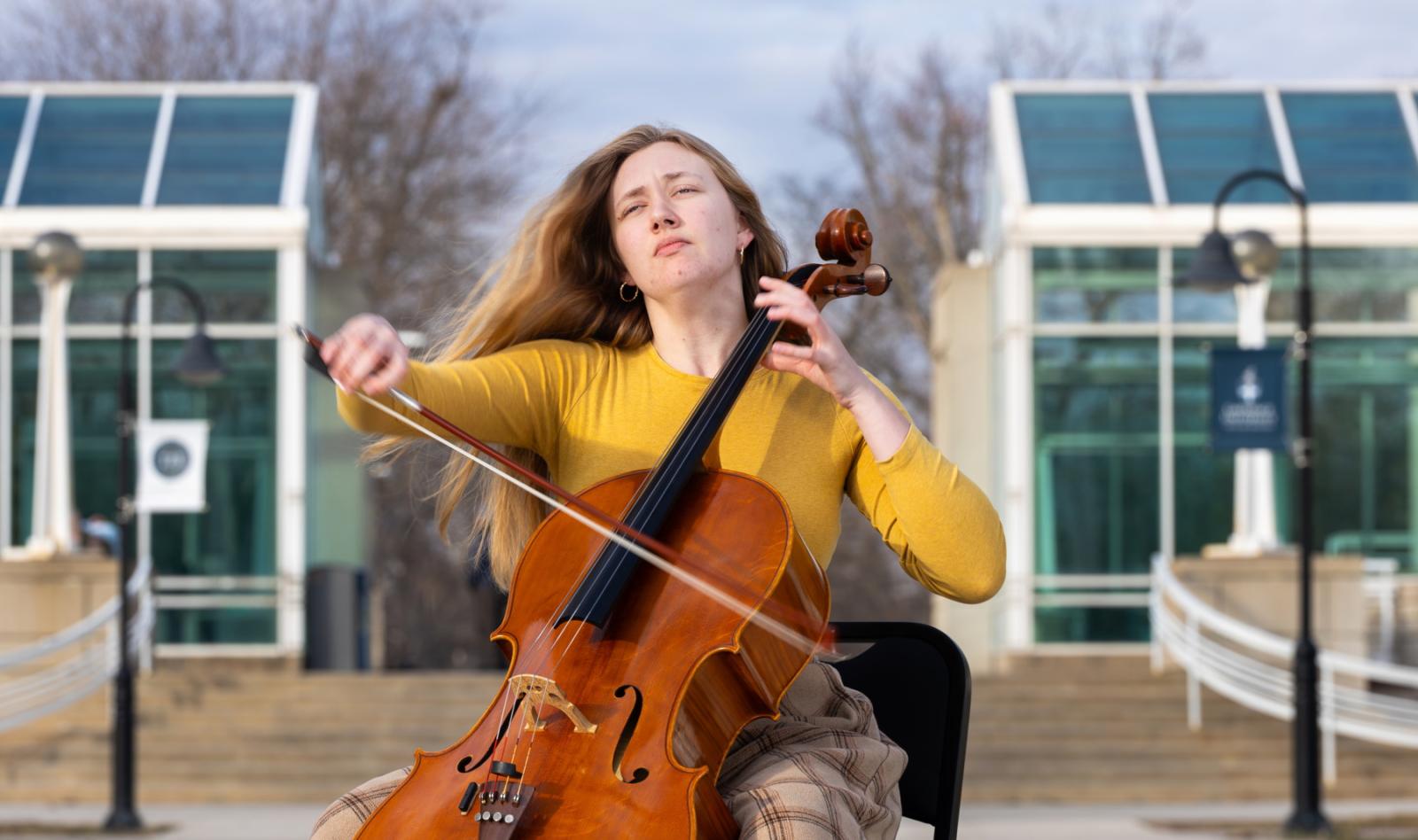“I didn’t believe it,” said Lawrence University junior Annika Schmidt.
Congratulatory texts were piling in from her cello studio group chat. Schmidt had performed earlier that day in the final stage of Lawrence’s annual Concerto Competition.
She set out to the Conservatory to see if it was true. Her Chinese food delivery would have to wait.
“I didn’t believe my name would actually be there, and then I saw it,” Schmidt said. “I was very surprised.”
There was the poster: Schmidt had won the competition, alongside fellow cellist David Smith, and she was now scheduled to perform in May as a soloist with the Lawrence Symphony Orchestra (LSO).
More on concerto competition co-winner David Smith: Physics, math, and cello
Her winning performance was of the Cello Concerto No. 1 in A minor by Camille Saint-Saëns. Written in the midst of French Romanticism, the work is a staple of the cello canon.
“It grabs your attention right away, with a huge chord,” Schmidt said.
Indeed, Saint-Saëns opted for a single loud chord in place of a traditional orchestral introduction; the soloist enters immediately.
“The beginning is very fiery; it’s a passionate piece,” Schmidt said. “From there, there are different characters within that.”
Although the first movement is generally turbulent, “there are moments of relaxation, but I think the real calm comes in the second movement,” she said. “It feels more innocent, more delicate. I view it more through the eyes of a child.”
The final movement returns to the mature opening character, but with a renewed jubilance: “With all the fast notes it really sparkles,” Schmidt said.
As a deeply Romantic concerto, the music is among Schmidt’s favorites. She highlights the thrill of fast settings where digging the bow into the strings produces an astounding resonance. The more lyrical sections are also a highlight.
“I love the long lines and the rich sound of the cello, and I get to pull that out with this [concerto],” she said.
Integrate intellectual and musical virtuosity in a supportive, creative community that will empower you to find your musical path.
Explore the structures of language—sounds, words, and sentences—and how these express and evoke meaning.
As an Appleton resident, Schmidt has been surrounded by both cello and Lawrence for most of her life.
“My brother also studied piano performance here and my mother worked in Admissions, so I knew it was a good school,” she said.
That childhood closeness to Lawrence was a comfort, Schmidt said.
“I thought I would [feel overexposed to Lawrence] by living in Appleton” but “actually being [at Lawrence] is a much different experience because it feels separate from the larger community,” she said.
Like many students, Schmidt has taken advantage of the university’s dual degree program, seeking a Bachelor of Music in cello performance and Bachelor of Arts in linguistics. Despite their surface-level differences, Schmidt often connects the two disciplines.
“I found that analyzing language changes the way I think about music: thinking about music as speech ... or analyzing how the phrase is put together or thinking about it in terms of words in a sentence.”
Looking forward, Schmidt has a long list of future Lawrence plans—in both music and linguistics. She is already considering combining the two topics for her capstone. Plans for increased ensemble work and community performances are also on her mind.
After Lawrence, Schmidt hopes to put another interest, ESL (English as a Second Language), to good use.
“Hopefully [I’ll] do some good work with people who need instruction in English,” she said.
She also plans to continue with her music because it’s an important part of her life.
“The importance of playing music is the connection between people,” Schmidt said. “I think that’s why I play cello, to connect with people more, to be vulnerable with people: share the music, share emotions.”
